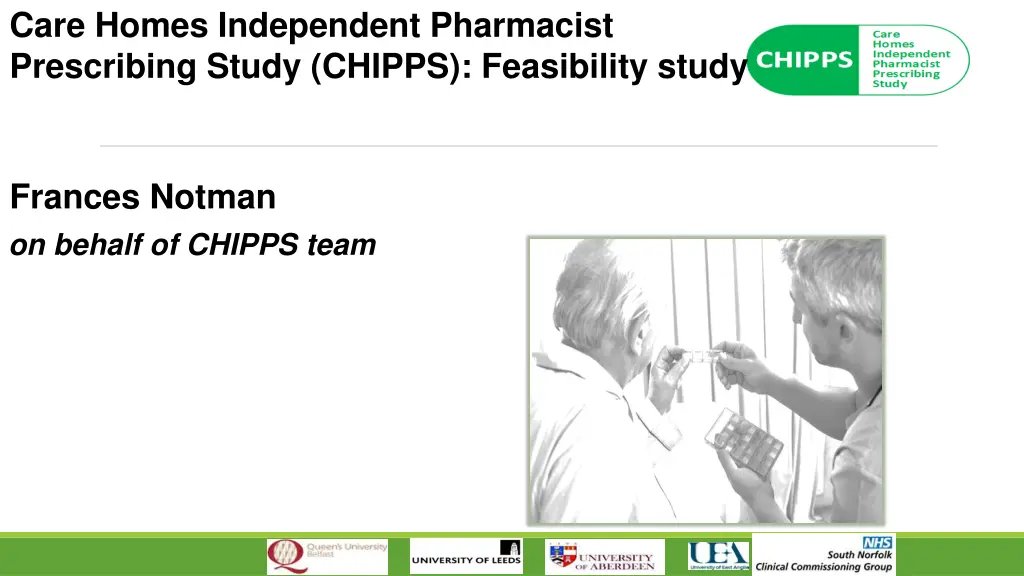
Pharmacist Independent Prescribing Study in Care Homes: CHIPPS Feasibility Study
Explore the feasibility of pharmacist independent prescribing (PIP) in care homes through the CHIPPS study. Aimed at improving medicines management, this study assesses effectiveness, cost-effectiveness, and stakeholder acceptability. Methods include systematic reviews, outcome measures evaluation, and health economic approaches. Trained pharmacists collaborate with GPs to provide optimized care for older residents. Qualitative feedback has been positive, indicating minimal changes needed.
Download Presentation

Please find below an Image/Link to download the presentation.
The content on the website is provided AS IS for your information and personal use only. It may not be sold, licensed, or shared on other websites without obtaining consent from the author. If you encounter any issues during the download, it is possible that the publisher has removed the file from their server.
You are allowed to download the files provided on this website for personal or commercial use, subject to the condition that they are used lawfully. All files are the property of their respective owners.
The content on the website is provided AS IS for your information and personal use only. It may not be sold, licensed, or shared on other websites without obtaining consent from the author.
E N D
Presentation Transcript
Care Homes Independent Pharmacist Prescribing Study (CHIPPS): Feasibility study Frances Notman on behalf of CHIPPS team http://www.nursinghomeabuseguide.org/wp-content/uploads/2015/04/Dollarphotoclub_81591470-1024x683.jpg
Background: the context Background: the context Medicines use in care homes is suboptimal One person should assume overall responsibility for medicines management Pharmacist independent prescribing (PIP) provides an opportunity for pharmacists to assume this role National programmes investing in increased pharmacist roles Care homes are an identified priority area Evidence needed to develop services 5/11/2025 2
Aim and objectives Aim and objectives Aim: To develop and deliver a cluster randomised controlled trial to assess the effectiveness and cost effectiveness of pharmacist independent prescribers (PIPs) assuming responsibility for medicines management within care homes compared to usual care Main Objectives: test and refine service specification assess service and research acceptability explore recruitment and retention evaluate potential outcome measures assess appropriateness of PIP training package 5/11/2025 3
CHIPPS Overview WP1: Systematic Review (SR) of evidence on medicine optimisation, stakeholder views, service spec. WP2:Identification and evaluation of potential out come measures WP3: Development of Health Economic approaches WP4: Develop and test training WP5: Non-randomised feasibility study WP6: RCT with internal pilot 5/11/2025 4
Method Registered PIP Trained and competent 16 hours per month GP/PIP CH (s) Working with GP 65 years and older At least one regular med Not end of life 10 residents 5/11/2025 5
PIP Service 5/11/2025 6
Qualitative outcomes- Interviews GP, CH manager and staff, Relatives Overall very positive Minimal changes suggested Few negative comments 5/11/2025 7
Qualitative outcomes- Interviews I ve been struggling with getting the monthly script and the systems the cycles already started .think with the research project on this is what the care homes need (DementiaNurseLeeds) better patient care, better medicines management you know for those patients and nursing homes. (B01GP) this and it s, you know, I go through look it s gone out of cycle because x, y, z, this is a new drug, we re in the middle of our medicine cycle, I need this and it s just like, it s trying to just get through layers and layers and layers before you actually get through to the person that you need to. So having somebody that you can say I need to speak to XXX (PIP), or whatever, and explaining to them and literally having it sorted out immediately can only be a benefit . (B01/CHstaff) .we ve been looking at somebody who we want some pain relief, it didn t arrive, it was supposed to arrive on Friday ..but one word from XXXX (PIP) and there it is. N01/01CHMan bring in more pharmacists to GP practices on a full time basis. (B01GP) been really safe practice for us. (BCHM03) I think pharmacists are increasingly a crucial resource within primary care and there have been moves over the last couple of years to she s kept us safe and it s been easy to make those changes really, really quickly, so no, it s If GPs want us to alter things you know they have to send faxes and I know they re busy, so I think it s of benefit in this setting. I think, I think one of the main problems we have sort of in this I think you know overall it just had led to setting getting medications is getting past the receptionists in the GP surgery, they re very much programmed into the computer says, you can t have Well, I know his respiradone had been reduced and he s much more like himself now, although the psycho- geriatrician did mention about reducing that as well but, he s just back to his old self really, I think he s on the minimum dose now morning and night so he s less sleepy and more with it and just you know carrying on a conversation just as usual. So I see a big difference in him now that s been reduced. B01-02-007 REL will be reviewed more regularly with the service, which makes their life a better quality of living, especially if they re in pain and not getting the right type of pain relief, you know, and GPs just firing out different things, they can really hone in on it as well. And also it will save the care home and the NHS (money). N01/01 CHMan so I think it has to be that the service becomes more effective, you know, residents I also know there s a professional behind me that s doing something that I don t have to double check at all. I don t have to turn round and double check what she s doing as this day of audits and auditing everything that happens, with somebody like that around I have got somebody else to share the job I think the pharmacist was able to spend more time with us and the resident looking at the medications that they were on, speaking to the staff who knew the residents really well and getting a detailed history which unfortunately we know the GPs haven t got the time to do ..really helpful, yeah. (A0101CHMAN) (A01/01/GP) because XXXX (PIP) is going in and dealing with maybe some of the issues that we would have dealt with in the past, that there s the potential that you see your patients less and you have less of a close relationship with some patients in the nursing homes so that would be a potential negative going forward(B01GP) (BCHM03) so we see it as a very positive thing. XXX (PIP) brings a lot of knowledge and time- efficiency to us and we work I guess side by side is the best way to put it. 5/11/2025 8
Focus Focus groups: PIP groups: PIP Service pressures impacting on time to meet care home staff Pharmaceutical Care Plans were time consuming Difficulty meeting GP (CCG employed pharmacist) Suggested time insufficient (20 hours cf 16 hours per month Training appropriate 5/11/2025 9
Focus Focus groups: PIP groups: PIP and I think that s fine if you have a good working relationship with that GP practice and from my point of view I ve worked with them for a long time, it s a care home that I know well, there s not going to be anything too awful on that because I d been dealing with that care home so I have that kind of reassurance, whereas if you were an independent prescriber pharmacist going in and it was a strange GP practice and you didn t know any of the residents, then actually signing those prescriptions before you ve actually done your care plan is perhaps a big ask (A01Ph) It (the training) has made you more motivated and more confident in going in and making changes to a patient s medications (PIP) 5/11/2025 10
Acknowledgement Acknowledgement This presentation summarises independent research funded by the National Institute for Health Research (NIHR) under its Programme Grants for Applied Research Programme (Grant Reference Number RP-PG-0613-20007). The views expressed are those of the author(s) and not necessarily those of the NHS, the NIHR or the Department of Health. The CHIPPS Research team acknowledges the support of the National Institute of Health Research Clinical Research Network (NIHR CRN). 11 5/11/2025
CHIPPS Research team CHIPPS Research team https://www.uea.ac.uk/chipps https://www.uea.ac.uk/chipps D. Wright R. Holland Professor of Pharmacy Practice, University of East Anglia Head of Medical School and Professor of Public Health Medicine, University of Leicester D.P. Alldred Associate Professor of Pharmacy Practice, University of Leeds A. Arthur Professor of Nursing Science, University of East Anglia G. Barton Professor of Health Economics, University of East Anglia A. Blyth Research Fellow, University of East Anglia C. Bond Professor of Primary Care, University of Aberdeen A. Daffu-O Reilly Research Fellow, University of Leeds J. Desborough Senior Lecturer in Pharmacy Practice, University of East Anglia J. Ford Consultant in Older Peoples' Medicine, NNUH NHS Foundation Trust C. Handford Public and Patient Involvement in Research, Norfolk and Suffolk H. Hill Consultant, Director Healthcare Homes, Essex C. Hughes Professor of Primary Care Pharmacy, Queens University J. Inch Research Fellow, University of Aberdeen V. Maskrey Research Fellow, University of East Anglia K. Massey Public and Patient Involvement in Research, Norfolk and Suffolk A. Millar Research Fellow, Queen s University Belfast P. Myint Professor of Old Age Medicine, University of Aberdeen N. Norris Professor of Education, University of East Anglia F. Notman Research Fellow, University of Aberdeen F. Poland Professor of Social Research Methodology, University of East Anglia L. Shepstone Professor of Medical Statistics, University of East Anglia I. Small Deputy Head of Prescribing Pharmaceutical Medicine, NHS Commissioning Board AM. Swart Professor of Medicine and Epidemiology, Director Norwich CTU, University of East Anglia C. Symms Sponsor s Representative, Norfolk & Suffolk Primary and Community Care Research Office, NHS South Norfolk Clinical Commissioning Group, Norfolk D. Turner Senior Research Fellow Health Economics, University of East Anglia A. Zermansky GP and Visiting Honorary Senior Research Fellow, University of Leeds





